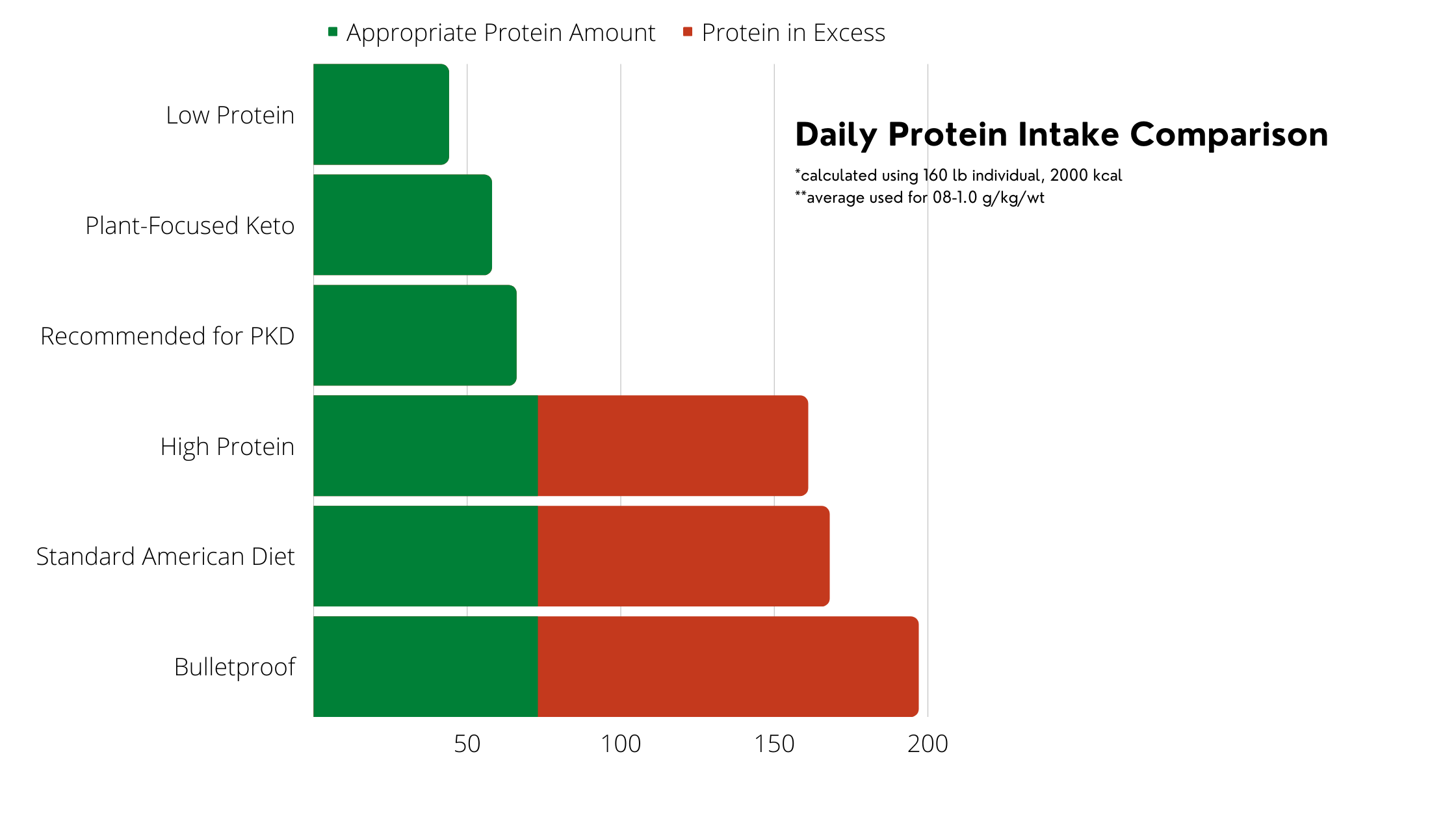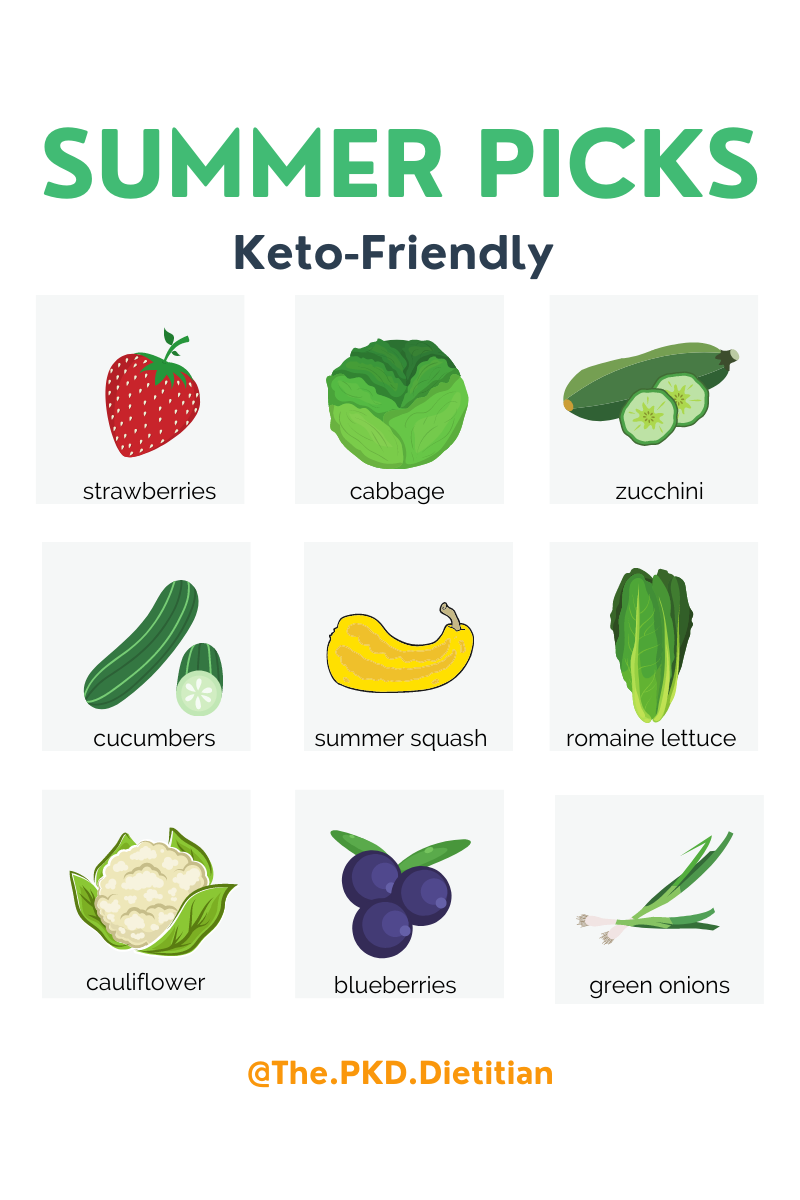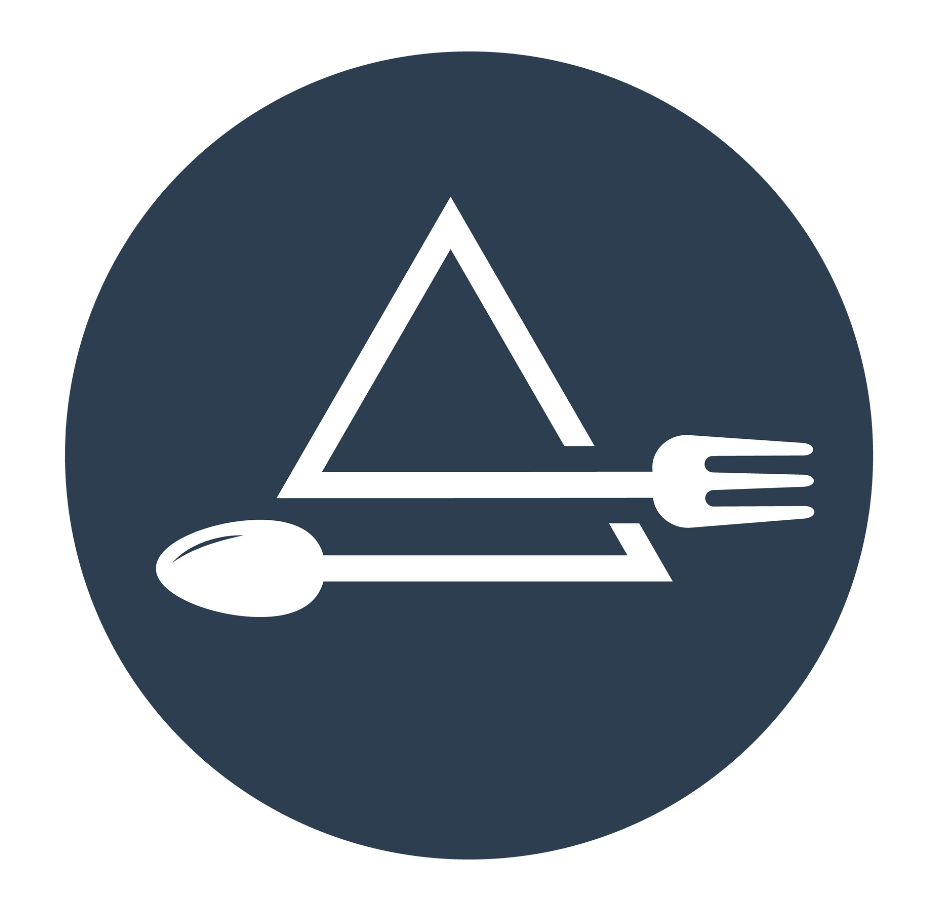
Keto & PKD - Two Myths and One Truth
Jun 21, 2022There is a lot of confusion about what ketogenic diet therapies are. The terms “Low-Carb” and “Ketogenic” tend to be used interchangeably. They are not the same though. While low-carb and keto diets overlap in a few ways, they vary significantly regarding potential health benefits, in their macronutrient profiles (protein, fat, carbs), and if they are safe for use with altered kidney function – such as with CKD or PKD. Let’s get into two of the biggest myths about ketogenic therapy and the kidneys, but also one truth. Want to see what a plant-focused ketogenic diet looks like? Make sure to download my free 4-day menu!
What are ketosis and a ketogenic diet?
The “ketogenic diet” is an umbrella term used to describe various eating patterns that aim to put someone into nutritional ketosis. Ketosis occurs when ketones are produced, as an energy source, by the body. Getting into ketosis is a natural process, the body shifts from using blood sugar from carbohydrates as its main energy source to using fat for energy and producing ketones. A ketogenic diet reduces carbohydrates, thus limiting blood sugar, and shifts the body into ketosis. Ketosis, simply put, is when ketones are present in your blood. Nutritional ketosis begins at a 0.5 mmol/L blood ketone level.
One of the most well-known “keto diets” is the Atkins diet, which was founded by Dr. Atkins in 1972 to promote weight loss and maintenance. These days there are lots of versions of “ketogenic diets” like bulletproof, dirty keto, carnivore, etc. All have one common goal and that is to limit carbohydrates in order to achieve and maintain a level of ketosis.
Other versions of “low carbohydrate” diets utilize some form of carbohydrate restriction as well as varying levels of protein recommendations. Both are important to look at regarding overall nutrient density and to consider the impact of high protein intake, especially animal meat, on kidney function and progression of PKD.
It isn’t just about taking away carbs and getting into ketosis. It matters what you are including nutrition-wise that is kidney protective. It also greatly matters what the protein burden, generated through diet is, on your kidneys. Both 100% matter to slow progression and help prevent loss of kidney function. A high protein diet can be both a cause and a contributor to kidney injury.
Myth #1: Keto is a high-protein diet
One of the most common misconceptions about ketogenic diet therapy is that it’s automatically high in protein. A ketogenic diet, according to the media, Pinterest, and many healthcare professionals is a low carbohydrate and very high protein diet. However, true ketogenic therapy is a low carbohydrate, moderate protein, and high-fat dietary pattern.
Ketogenic diet therapy, developed over 100 years ago to treat childhood epilepsy, provides 1.0 g of protein/kg body weight per day. (1) To put this in perspective, a “high protein diet” is considered > 1.2 g of protein/kg body weight per day. The standard American dietary pattern averages 1.3 g of protein/kg body weight per day. (2) That for sure is high protein! Talk about being “overnourished” with protein and saturated with kidney stressors.
Unfortunately, within the kidney community concern is expressed about ketogenic therapy based on the myth that all keto is high in protein. This concern is expressed in the absence of clinical studies to support it all the while evidence-based work is showing the opposite regarding ketogenic therapy, showing ketones even being renal-protective for kidney health.
Why are a lot of ketogenic diets marketed as high protein?
Simple, animal meat has minimal carbs. It makes “doing” keto easy. It also makes following a meat-based keto, which I refer to as meat-o-keto, dangerous for your long-term kidney health with PKD. The primary source of kidney stress and stressors in our diet is protein. Specifically animal protein. High intakes of animal meat protein are associated with greater waste, a more acidic diet, faster progression of kidney disease, and yes – kidney stones. (3-10) It is widely accepted, and backed up by a plethora of research, that a plant-focused dietary pattern is protective of kidney function and helps reduce complications associated with kidney damage and disease. (11-13)
Where does all the confusion come from?
Popular weight-loss diets, based on keto, encourage increasing protein intake and dramatically decreasing carbohydrate intake. Protein in these diets ranges from 1.2-2.3 g/kg/weight per day. The Bulletproof version of keto is promoted as “PKD Friendly” and itself averages 1.4-1.7 g/kg/weight per day. (14-15) All of these are high-protein dietary patterns. All of these are not kidney-friendly when there is already impaired kidney function or damage. All of these are not PKD-friendly.

What does the research show?
Historically, studies looking at the impact of ketogenic therapy and the kidneys use either a Low Carbohydrate (LC) or a Low Carbohydrate High Protein (LCHP) diet. (16) These are not the same as ketogenic therapy but are often considered to be one and the same. Both LC and LCHP diets restrict carbs and replace them with protein-rich foods plus fat. Both a LC and LCHP diet patterns do have high protein intakes. Research is a bit all over the place regarding an LC dietary pattern, primarily because there is no one agreed-upon definition for LC and its macronutrient profile. Ketogenic Nutrition Therapy, which uses moderate protein intake, is much more in line with recommendations for protein intake with PKD. (17)
Depending on your kidney function and specific needs, the recommended protein intake for PKD varies. A generalized recommendation is 0.8-1.0 g/kg/weight of protein per day. (16-18) The type of protein also matters. Eating a lot of protein, especially red and animal meat, puts pressure on the kidneys to filter out toxins and waste and to balance the acidic environment that is generated. (19-23)
Myth #2: You must cut out fruit and limit vegetables
You may have heard that the keto diet involves cutting out all fruit and vegetables. While this is true for some starchy fruits and vegetables, it's not true across the board. Leafy green vegetables like arugula and kale are low in carbohydrates, so you can absolutely enjoy them on a regular basis. However, root vegetables such as potatoes don’t fit within a ketogenic diet because they're high in starchy carbs. Ketogenic diet therapy, when tailored to YOUR needs, can be plant-focused and contain a variety of fruits and vegetables. You absolutely can get into, and maintain ketosis, with > 20 net carbs. You absolutely can eat berries, and vegetables, and should include them daily with every meal. Learning what to include and what to limit is important to support YOUR needs and goals.
Check out some of my favorite, ketogenic-friendly, summer produce!
Truth #1: Plant-forward ketogenic diet therapy is a safe option for Polycystic Kidney Disease (PKD)
Plant-focused ketogenic therapy is both kidney-safe and kidney-protective. The average protein intake is 0.8 g of protein/kg body weight per day. The focus is on a foundation of plant-based protein sources, a variety of fruits, vegetables, and healthy fat. The antioxidant and anti-inflammatory benefits that come with plant-focused not only support less kidney work, but they support overall health. Being nutrient-dense and protein-moderate, plant-focused keto is an overall alkaline dietary pattern and does not promote an acidic environment. Just the opposite, plant-focused is base producing and will help keep the balance in your body and take work off your kidneys.
Bottom Line
“Keto” can be high protein when done unsafely, but it doesn’t have to be! Know what your needs are and get the support you need to live a healthy PKD lifestyle.
If you want to do ketogenic therapy for PKD always make sure you are considering the long-term health of your kidneys. A therapeutic ketogenic diet needs to be well planned and specific to your needs, your medical factors, and your likes. To be successful there are not only dietary modifications but lifestyle changes to incorporate. Support and guidance with this process are invaluable.
Want to see what a plant-focused keto diet looks like?
>>> Download my FREE 4-day menu! <<<
In health,
Diana, The PKD Dietitian
References
- Wheless JW. History of the ketogenic diet. Epilepsia. 2008 Nov;49 Suppl 8:3-5. doi: 10.1111/j.1528-1167.2008.01821.x. PMID: 19049574. Pubmed
- Data from the National Health and Nutrition Examination Survey (NHANES) Pubmed
- Ko GJ, Rhee CM, Kalantar-Zadeh K, Joshi S. The Effects of High-Protein Diets on Kidney Health and Longevity. J Am Soc Nephrol. 2020 Aug;31(8):1667-1679. doi: 10.1681/ASN.2020010028. Epub 2020 Jul 15. PMID: 32669325; PMCID: PMC7460905. Pubmed
- Jhee JH, Kee YK, Park S, Kim H, Park JT, Han SH, Kang SW, Yoo TH. High-protein diet with renal hyperfiltration is associated with rapid decline rate of renal function: a community-based prospective cohort study. Nephrol Dial Transplant. 2020 Jan 1;35(1):98-106. doi: 10.1093/ndt/gfz115. PMID: 31172186. Pubmed
- Friedman AN. High-protein diets: potential effects on the kidney in renal health and disease. Am J Kidney Dis. 2004 Dec;44(6):950-62. doi: 10.1053/j.ajkd.2004.08.020. PMID: 15558517. Pubmed
- Hariharan, D., Vellanki, K. & Kramer, H. The Western Diet and Chronic Kidney Disease. Curr Hypertens Rep17, 16 (2015). Article
- Friedman AN. High-protein diets: potential effects on the kidney in renal health and disease. Am J Kidney Dis. 2004 Dec;44(6):950-62. doi: 10.1053/j.ajkd.2004.08.020. PMID: 15558517. Pubmed
- Bernstein AM, Treyzon L, Li Z. Are high-protein, vegetable-based diets safe for kidney function? A review of the literature. J Am Diet Assoc. 2007 Apr;107(4):644-50. doi: 10.1016/j.jada.2007.01.002. PMID: 17383270. Pubmed
- Kramer H. Diet and Chronic Kidney Disease. Adv Nutr. 2019;10(Suppl_4):S367-S379. doi:10.1093/advances/nmz011 Pubmed
- Asoudeh F, Talebi S, Jayedi A, Marx W, Najafi MT, Mohammadi H. Associations of Total Protein or Animal Protein Intake and Animal Protein Sources with Risk of Kidney Stones: A Systematic Review and Dose-Response Meta-Analysis. Adv Nutr. 2022 Jun 1;13(3):821-832. doi: 10.1093/advances/nmac013. PMID: 35179185; PMCID: PMC9156392. Pubmed
- Kalantar-Zadeh K, Joshi S, Schlueter R, Cooke J, Brown-Tortorici A, Donnelly M, Schulman S, Lau WL, Rhee CM, Streja E, Tantisattamo E, Ferrey AJ, Hanna R, Chen JLT, Malik S, Nguyen DV, Crowley ST, Kovesdy CP. Plant-Dominant Low-Protein Diet for Conservative Management of Chronic Kidney Disease. Nutrients. 2020 Jun 29;12(7):1931. doi: 10.3390/nu12071931. PMID: 32610641; PMCID: PMC7400005. Pubmed
- Joshi S, Shah S, Kalantar-Zadeh K. Adequacy of Plant-Based Proteins in Chronic Kidney Disease. J Ren Nutr. 2019 Mar;29(2):112-117. doi: 10.1053/j.jrn.2018.06.006. Epub 2018 Aug 16. PMID: 30122652. Pubmed
- Carrero JJ, González-Ortiz A, Avesani CM, Bakker SJL, Bellizzi V, Chauveau P, Clase CM, Cupisti A, Espinosa-Cuevas A, Molina P, Moreau K, Piccoli GB, Post A, Sezer S, Fouque D. Plant-based diets to manage the risks and complications of chronic kidney disease. Nat Rev Nephrol. 2020 Sep;16(9):525-542. doi: 10.1038/s41581-020-0297-2. Epub 2020 Jun 11. PMID: 32528189. Pubmed
- Amanda Suazo, “What Are Macros and Should You Count Them,” Bulletproof, accessed June 6, 2022
- Dave Asprey, “Bulletproof Roadmap”, accessed June 6, 2022
- Mitchell NS, Scialla JJ, Yancy WS Jr. Are low-carbohydrate diets safe in diabetic and nondiabetic chronic kidney disease?. Ann N Y Acad Sci. 2020;1461(1):25-36. doi:10.1111/nyas.13997 Article Link
- Chebib FT, Torres VE. Recent Advances in the Management of Autosomal Dominant Polycystic Kidney Disease. Clin J Am Soc Nephrol. 2018 Nov 7;13(11):1765-1776. doi: 10.2215/CJN.03960318. Epub 2018 Jul 26. PMID: 30049849; PMCID: PMC6237066. Article Link
- Carriazo S, Perez-Gomez MV, Cordido A, García-González MA, Sanz AB, Ortiz A, Sanchez-Niño MD. Dietary Care for ADPKD Patients: Current Status and Future Directions. Nutrients. 2019; 11(7):1576. Pubmed
- Watanabe M, Tuccinardi D, Ernesti I, Basciani S, Mariani S, Genco A, Manfrini S, Lubrano C, Gnessi L. Scientific evidence underlying contraindications to the ketogenic diet: An update. Obes Rev. 2020 Oct;21(10):e13053. doi: 10.1111/obr.13053. Epub 2020 Jul 10. PMID: 32648647; PMCID: PMC7539910. Pubmed
- Helal, I., Fick-Brosnahan, G., Reed-Gitomer, B. et al.Glomerular hyperfiltration: definitions, mechanisms and clinical implications. Nat Rev Nephrol 8, 293–300 (2012). Article Link
- Knight EL, Stampfer MJ, Hankinson SE, Spiegelman D, Curhan GC. The impact of protein intake on renal function decline in women with normal renal function or mild renal insufficiency. Ann Intern Med. 2003 Mar 18;138(6):460-7. doi: 10.7326/0003-4819-138-6-200303180-00009. PMID: 12639078. Pubmed
- Haring B, Selvin E, Liang M, Coresh J, Grams ME, Petruski-Ivleva N, Steffen LM, Rebholz CM. Dietary Protein Sources and Risk for Incident Chronic Kidney Disease: Results From the Atherosclerosis Risk in Communities (ARIC) Study. J Ren Nutr. 2017 Jul;27(4):233-242. doi: 10.1053/j.jrn.2016.11.004. Epub 2017 Jan 5. PMID: 28065493; PMCID: PMC5476496. Pubmed
- Lew QJ, Jafar TH, Koh HW, Jin A, Chow KY, Yuan JM, Koh WP. Red Meat Intake and Risk of ESRD. J Am Soc Nephrol. 2017 Jan;28(1):304-312. doi: 10.1681/ASN.2016030248. Epub 2016 Jul 14. PMID: 27416946; PMCID: PMC5198288. Pubmed

